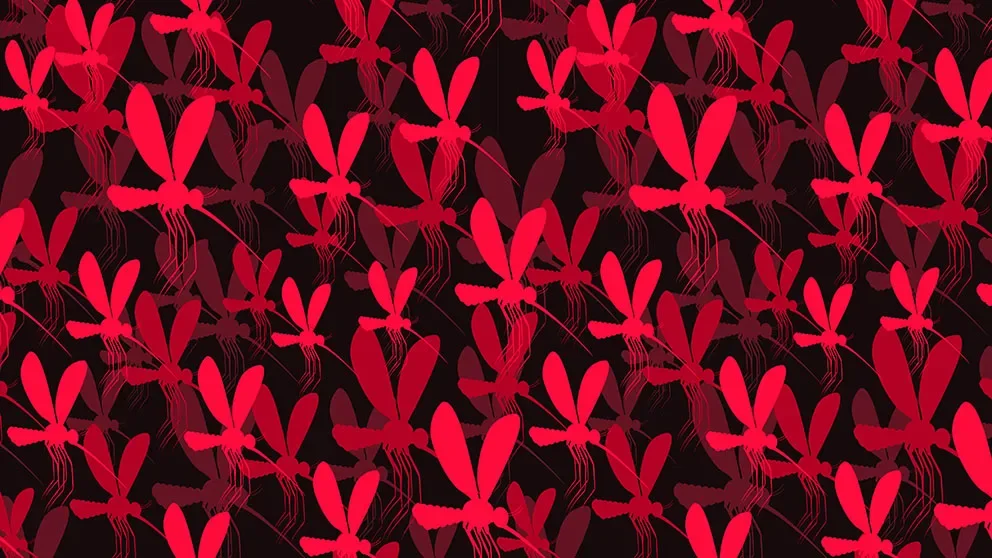Mosquitoes suck: Can science deliver us from these deadly pests?
The Search Magazine Article | May 8, 2017
No one likes mosquitoes. Here in the Northeast U.S. they are mostly a nuisance; they befoul picnics, barbecues, and hiking trips, and their bites are itchy and ugly. But in large parts of the world, mosquitoes are far more than an inconvenience; they are deadly. In fact, according to several sources, mosquitoes are the most deadly animals on the planet — by a large margin — due to the devastating diseases they transmit. These diseases include malaria, Zika virus, dengue virus, and other viruses that cause deadly encephalitis (brain swelling). Some of the mosquito species that transmit these diseases are endemic in the Southern U.S.
In the South, mosquito abatement costs big tax dollars. The University of Florida estimates that the state spends $160 million to control the mosquito population in an average year. Much of that is spent on pesticide spraying, which is fraught with it’s own issues; insecticides that kill mosquitoes, like permethrin, also sicken insects we enjoy, like honeybees, fireflies and butterflies. Florida also uses also chemical-free solutions, like eliminating pools of standing water, which function as mosquito larvae nurseries, and introducing Gambusia (mosquitofish) to larvae-infested waters. But these efforts are labor intensive and require vigilant monitoring of mosquito breeding grounds. Could there be an easier way?
Two companies are vying for the rights to use new technologies in the U.S. to combat mosquitoes and the diseases they transmit, and have received approval to conduct trials in the Florida Keys. Both technologies targetAedes aegypti mosquitoes, which are prevalent in the Southern U.S. and can spread yellow fever, dengue fever, Chikungunya fever and Zika, among other diseases. Since only female mosquitoes bite, both companies aim to modify male mosquitoes to limit peoples’ fears of being bit by engineered pests (although both technologies have been approved safe by the FDA, finding no potential adverse impact on human health or the environment). Both rely on engineered males mating with wild females to reduce the offspring in subsequent generations. Since the average adult life span ofA. aegypti is 2-4 weeks, this strategy could rapidly reduce the mosquito population within a given season.
MosquitoMate’s technology involves the infection of male A. aegypti mosquitoes with a bacterium called Wolbachia. Wolbachia is a common pathogen for many insects, just not normally A. aegypti. The infection is passed to the eggs, and the offspring never hatch, thereby limiting the mosquito replication cycle and overall population. MosquitoMate has completed trials in Kentucky, California, and New York, and demonstrated a greater than 80% reduction of the biting mosquito populations. In April, they released 20,000 Wolbachia-infected males in the FL Keys in advance of the mosquito season. Although the Keys have yet to report local Zika transmission, other mosquito borne illnesses, such as dengue and Chikungunya have become more prevalent in recent years, and the hope is that MosquitoMate’s mosquitoes will significantly reduce the spread of illness this year.
Oxitec is the other company approved to release engineered mosquitoes in the Keys, although they use a genetic approach. They have modifiedA. aegypti males to produce a protein that, when passed to offspring, results in non-viable mosquito eggs. In trials in Brazil, the Cayman Islands and other countries, Oxitec has measured a reduction in the population of A. aegypti by 90 percent or more. But some residents of the Keys are wary of this technology and its potential impacts. Because of vocal opposition to the trial, the Mosquito Control District's Board of Commissioners decided to submit the trial to the voters. One was for the residents of Key Haven, the community where the trials were proposed. The residents of Key Haven voted “no”, so no mosquitoes will be released there. However, the other referendum went before all voters in the county and passed in November 2016, but it is not yet clear if a final location has been chosen.
It bears noting that humans do not have a good track record when it comes to biologically engineered pest control. Also known as biological control, the introduction of predatory plants and animals (in this case, modified mosquitoes) has resulted in some devastating, unforeseen environmental impacts, even extinctions. For example,Myxoma virus was introduced to control the European rabbit population in Great Britain in the 1950’s. Larvae of the large blue butterfly complete their life cycle in the nests of a species of ant that only build underground in well-grazed areas. Myxoma virus was so successful in killing off the rabbit population that reduced grazing caused the ant population to sharply decline and resulted in the extinction of the butterfly.
Several scientists have argued, however, that elimination of A. aegypti, and perhaps all mosquitoes, would bear little burden on the environment, and that the impact on human health would far outweigh any negatives. Given the advent of these new mosquito control technologies, we may be on the precipice of finding out whether or not that is true.
